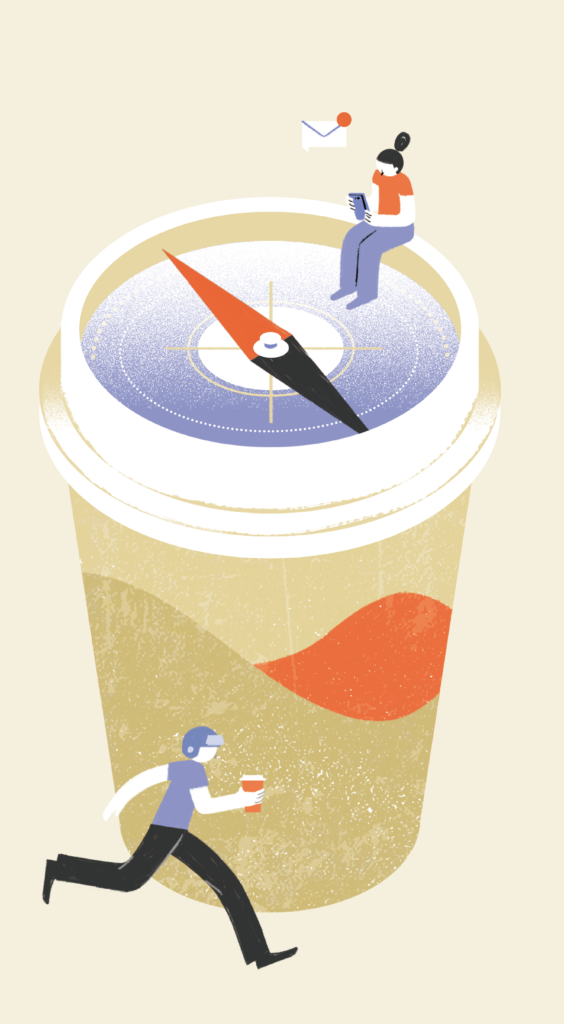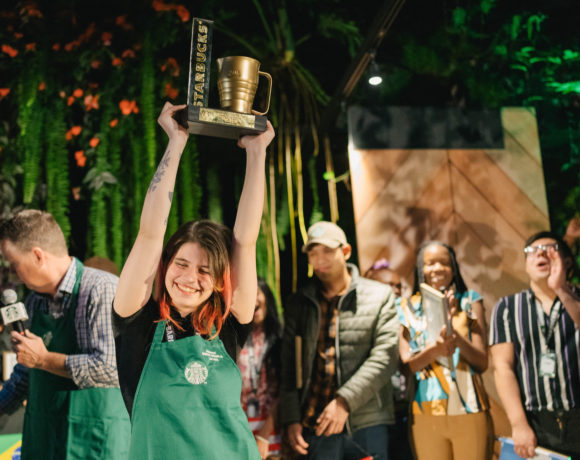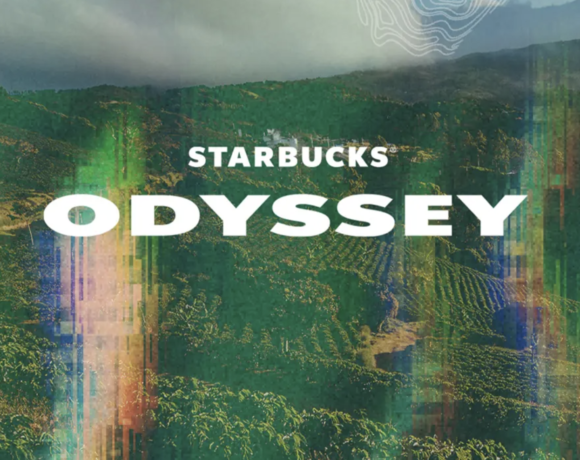
Illustrated by Eve-3L
On January 8, 2020, luckin coffee announced its new retail strategy with an unmanned smart coffee machine, luckin coffee EXPRESS, and smart vending machine luckin popMINI to further diversify its network, making coffee even more accessible to consumers. As the store number reached 4,507 by the end of 2019, the Chinese coffee brand boasted a total of 40 million cumulative customers so far. A customer can order coffee online via its dedicated mobile application and mini program on WeChat, a Chinese communication app. By taking full advantage of technologies and the development of food delivery services in China, luckin coffee has helped promote coffee culture in China and raised a generation of coffee drinkers regardless of age who are getting used to takeaway coffee by delivery.
According to a report on the trend of coffee consumption in China by CNBDATA and Tmall last May, coffee delivery orders grew by 60 per cent in 2018 compared to a year earlier. The number of newly joined coffee shops for delivery services on Ele.me, a food delivery platform acquired by Alibaba Group, increased by 32 per cent during the same period. The trend of coffee delivery, on the other hand, has created more scenarios for enjoying a cup of coffee but also made it possible to reach a wider range of customers. The report also indicates that more people started to order coffee for breakfast and lunch break in the first quarter of 2019, a ratio of 15 per cent compared to that of 11 per cent in 2018.
In September 2018, Starbucks Delivers was launched in China in partnership with Ele.me. “By now, the services have covered more than 3,000 Starbucks stores in 100 cities across the country,” introduced Boya Ni, who is in charge of coffee sector at Ele.me. As Ni shared, Starbucks Delivers can dispatch an order within eight minutes and complete the delivery in an average of less than 18 min- utes. “The customer satisfaction rate is 99.9 per cent,” she revealed.
As an initiative to diversify dining experiences, Starbucks China opened its third Star Kitchen in a Fresh Hema store in Beijing on June 19, 2019 after opening stores in Shanghai and Hangzhou respectively. Customers at Fresh Hema can easily order a coffee and dine in while coffee orders can also be dispatched with grocery shop- ping orders using Hema’s delivery system.

Illustrated by Eve-3L
“Starbucks and Ele.me have connected both membership systems, which means a registered member from either side can enjoy membership benefits on both plat- forms, including free delivery, double membership points, etc.,” Ni shared.
According to a report by NASDAQ, Starbucks Rewards members reached 10 million in China by the end of fiscal Q4 last year, a year-on-year increase of 45 per cent. It is said that mobile orders accounted for 10 per cent of sales in China during the last quarter of the fiscal year.
“Our two targeted long-term growth markets, the U.S. and China, performed extremely well across a number of measures as a result of our focus on enhancing the customer experience,” said Starbucks’ President and CEO Kevin Johnson in a press release, “driving new beverage innovation and accelerating the expansion of our digital customer relationships.”
Ni shared that mini programs on multiple mobile applications such as Taobao, Alipay, and Ele.me can all offer coffee ordering services that will allocate orders based on store availability and capabilities automatically. It also takes delivery time and available riders into account to ensure the fastest possible delivery for a customer.
Apart from big chains like KFC and McCafe and coffee giants like Starbucks and Peet’s Coffee competing on the coffee delivery market, independent coffee shops expect to share a slice of the cake as well as reach more potential customers through food delivery platforms.
Established in 2018 as an online brand, Shanghai-based 100FFEE CAFE opened its first offline coffee shop to the public last October. “It’s hard to provide intimate services based on customers’ needs online,” shared Yifei Yang, co-founder of the brand. “Before the only thing we could do was take strict controls on sourcing roasted coffee beans. But from seed to cup, roasting is not the final step. We want to create a good experience for those who love coffee, sharing coffee knowledge and promoting specialty coffee culture in China.” To him, variants such as storage of beans, brewing methods and recipes all matter a lot in the final cup.

Illustrated by Eve-3L
In Yang’s view, specialty coffee, especially pour-over coffee, is not suitable for delivery. “The takeaway cup might affect the taste of a coffee while temperature lost during the delivery is a worrying factor.” At the moment, 100FFEE CAFE only offers espresso-based coffees and teas for delivery. “We use four different beans in store for espresso-based drinks but only two of them are available online for their stability in taste and flavors during the delivery tests,” Yang told us.
Their top two factors to consider in the delivery service are split-proof and temperature. For Starbucks, measures have been taken to ‘lock-in’ the temperature. Starbucks Delivers is equipped with special delivery boxes developed by Ele.me. “Meanwhile, the TPU ice cooler pack we use can keep the drink under 5℃ for up to six hours if the box is not opened during the delivery,” Ni said. The ‘data’ is backed with a series of testing deliveries, totaling 2,000 hours by delivery time and 12,000 kilometers by distance.
Meanwhile, Yang attributed the New Retail business model to the decision behind the launch of the cafe’s delivery service online, which became available in early January. “New Retail has changed many Chinese lifestyles. A single location offline can reach a limited number of customers. Word-of-mouth is an effective marketing strategy but the visits by a customer will be greatly affected by their lifestyles, living areas, and limited free time,” he explained. Coffee delivery just ticks the boxes of most people nowadays. With a few clicks on a mobile phone, your coffee will arrive in minutes.
In 2018, the users for online food delivery services in China surpassed 350 million with the market size of over 240 billion yuan, reported by iiMedia Research. It is also estimated that the user number will reach 477 million by 2020.
When big chains manage to earn profits through delivery services, independent coffee shops take this service as a meaningful step to enhance their brand awareness and promote the specialty coffee culture. “The earnings from coffee delivery may be less than expected due to a couple of reasons such as service charges or delivery fees,” Yang said. “But it will make us seen and known by more potential customers.”

Illustrated by Eve-3L
It is not hard to see that people like to purchase products that are diversified, healthy, and in good quality with a preference for efficiency. That’s why Starbucks China last year launched Starbucks Now, a pick-up service in store, and voice ordering through Tmall Genie, a voice-activated AI smart speaker developed by Alibaba. “As the combining of traditional services and digital technologies accelerates, more new kinds of services are made available, which breeds new needs from consumers,” Ni said. “It also changes people’s attitudes and ways to shopping as time goes.”
Apart from coffee delivery, new trends like robotic baristas and unmanned coffee machines have offered more options for people to enjoy a cup of coffee easily today. “In future, platforms serving as a comprehensive ecosystem will not only provide technologies and data resources but also support digital upgrades with service improvement to meet up-to-date needs, offering quality experiences to consumers,” Ni concluded. Coffee is more than a drink but also a ‘taste’ of technology.












NO COMMENT